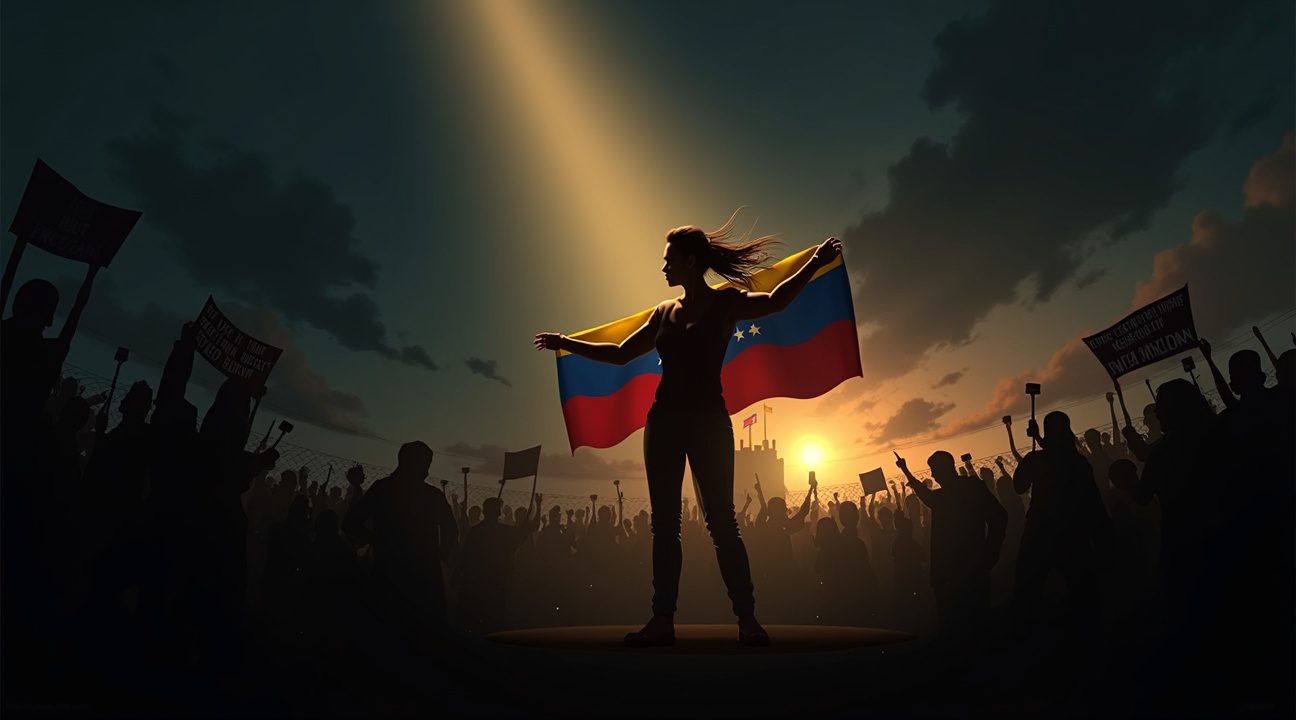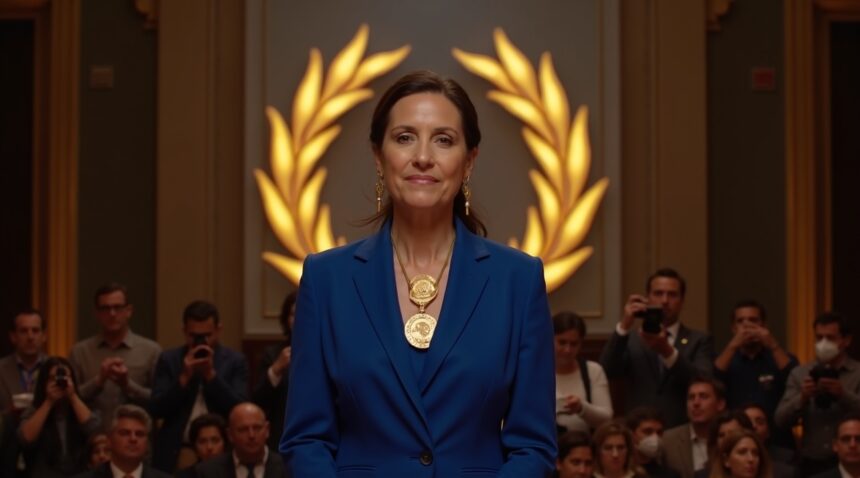Maria Corina Machado’s receipt of the 2025 Nobel Peace Prize marks a historic milestone as the first Venezuelan woman to earn this prestigious recognition, honoring her relentless advocacy for democratic rights and peaceful resistance against authoritarian rule.
The Norwegian Nobel Committee recognized Maria Corina Machado for her outstanding efforts to promote a just and peaceful transition from dictatorship to democracy in Venezuela. Her inclusion in the list of Nobel laureates highlights her courageous stance against oppression and her commitment to nonviolent solutions.
Key Takeaways
- Maria Corina Machado became the first Venezuelan woman to win the Nobel Peace Prize in 2025, recognized for her enduring fight for democratic rights and leading peaceful efforts for political transition.
- Despite her 2023 primary election victory, Venezuelan authorities disqualified her from the 2024 presidential race, forcing her into hiding due to persecution and credible threats from the government.
- Through her political movement Vente Venezuela and the SoyVenezuela alliance, she played a key role in strategically uniting the country’s fragmented opposition forces into a coherent pro-democracy front.
- Machado’s international recognition predates the Nobel, including her appearance on the BBC 100 Women list (2018), Time’s 100 Most Influential People (2025), and joint honors from the European Parliament such as the Václav Havel Human Rights Prize and the Sakharov Prize in 2024.
- The Nobel Peace Prize was awarded amid a global democratic crisis, with the Committee emphasizing Machado’s model of peaceful resistance as a global blueprint for democracy advocates facing authoritarian regimes.
Machado’s honor is not only a personal triumph, but also a symbolic victory for democratic movements in Latin America and beyond. Her story stands as a testament to the power of resilience, strategic unity, and peaceful defiance in the face of repression.
Nobel Peace Prize Recognition
Maria Corina Machado received the Nobel Peace Prize in October 2025, marking a historic achievement for Venezuelan democracy advocates. The Norwegian Nobel Committee honored her “for her tireless work promoting democratic rights for the people of Venezuela and for her struggle to achieve a just and peaceful transition from dictatorship to democracy.“
This recognition places Machado among an elite group of individuals who’ve dedicated their lives to defending human rights under oppressive regimes. It is particularly significant that she became the first Venezuelan woman to receive this prestigious honor, breaking new ground for her country on the international stage.
Following a Pattern of Resistance Leaders
Machado’s recognition continues a recent trend of the Nobel Committee acknowledging leaders who’ve challenged authoritarian rule through peaceful means. The award aligns her legacy with other remarkable figures recently honored for similar efforts:
- Narges Mohammadi from Iran, who won in 2024 for her fight against the oppression of women and her advocacy for promoting human rights and freedom for all.
- Ales Bialiatski from Belarus, recognized in 2023 for his outstanding effort to document war crimes, human rights abuses, and the abuse of power.
- The Memorial human rights organization and other civil society leaders who’ve stood against authoritarianism in various contexts.
The Nobel Committee’s decision reflects their recognition that defending democracy requires extraordinary courage, especially when facing persecution and exile. Machado’s journey from opposition leader to Nobel laureate demonstrates how sustained commitment to democratic principles can eventually gain international recognition, even when groundbreaking achievements seem impossible under repressive conditions.
The Committee emphasized that Machado’s work exemplifies the defense of democracy, which they stated serves as the foundation of both internal and international peace. This perspective becomes especially crucial at a time when global democracy faces serious challenges across multiple continents. Her recognition sends a powerful message that the international community continues to value and support those who risk everything for democratic ideals.
Machado’s Nobel Prize recognition also highlights how individual acts of resistance can inspire broader movements for change. Her unwavering commitment to peaceful opposition, despite facing government persecution and personal threats, has provided hope for millions of Venezuelans who continue to struggle under authoritarian rule. The award validates not only her personal sacrifices but also the broader Venezuelan opposition movement’s commitment to nonviolent resistance.
The timing of this recognition carries particular weight given Venezuela’s ongoing political crisis and the international community’s continued concern about human rights violations in the country. By honoring Machado, the Nobel Committee has drawn global attention to Venezuela’s democratic struggles while reinforcing the principle that peaceful resistance to oppression deserves international support and recognition.
This achievement also underscores the vital role that women play in democracy movements worldwide. Machado’s recognition as the first Venezuelan woman to win the Nobel Peace Prize highlights how female leaders often serve on the front lines of struggles for human rights and democratic governance, sometimes at great personal cost.
The award ceremony and subsequent international attention have provided Machado with an unprecedented platform to advocate for Venezuelan democracy on the world stage. Her Nobel Prize status enhances her ability to build international coalitions and maintain pressure on the Venezuelan government while inspiring continued resistance efforts within the country. The recognition transforms her from a regional opposition figure into a globally recognized champion of democratic values.
Opposition Leader’s Historic Electoral Victory and Government Persecution
Maria Corina Machado stands as one of Venezuela’s most influential opposition figures, dedicating her career to challenging authoritarian rule through democratic principles. I’ve observed her journey from a successful businesswoman to a fearless political leader who refuses to be silenced by government intimidation.
Rise to Political Prominence
Machado’s political ascent began with her election to the National Assembly in 2010, where she achieved a remarkable milestone by securing the highest vote count of any candidate nationwide while representing the Miranda region. Her overwhelming electoral success demonstrated the Venezuelan people’s hunger for authentic opposition leadership during a time of increasing political repression.
Building on this momentum, she founded the Vente Venezuela party in 2013, creating a platform specifically designed to advance liberal democratic values in a country sliding deeper into authoritarianism. The party quickly became a beacon for Venezuelans seeking an alternative to the socialist policies that had devastated their nation’s economy and institutions.
Her most significant political achievement came in 2023 when she won the opposition primary election, earning the right to serve as the unity candidate for the 2024 Venezuelan presidential election. This victory represented more than just personal success – it symbolized the opposition’s ability to unite behind a single leader capable of challenging the Maduro regime’s grip on power.
Government Retaliation and Persecution
The Venezuelan government’s response to Machado’s growing influence has been swift and ruthless. Despite her legitimate victory in the opposition primary, authorities barred her from participating in the 2024 presidential election, effectively disenfranchising millions of Venezuelans who supported her candidacy.
This pattern of persecution has deep roots in Machado’s willingness to confront the regime directly. In 2014, she faced expulsion from Parliament after delivering a powerful critique of government abuses during a session at the Organization of American States. The pro-government leadership’s decision to remove her violated both due process and international law, yet it demonstrated their fear of her ability to expose their crimes on the global stage.
The situation has become increasingly dangerous for Machado personally. Following the controversial 2024 election results, she was forced into hiding due to credible threats from the Maduro regime. This forced disappearance highlights the systematic persecution faced by opposition leaders who dare to challenge Venezuela’s authoritarian government.
Her current situation reflects a broader pattern of government intimidation that has characterized Venezuelan politics for years. Opposition figures routinely face arrest, exile, or worse simply for exercising their democratic rights. Machado’s case has become emblematic of this struggle, as she continues to advocate for Venezuelan democracy despite personal risks that would deter most political leaders.
The international community has taken notice of these violations, with various organizations condemning the Venezuelan government’s treatment of opposition figures. Machado’s persecution has become a symbol of the broader human rights crisis engulfing Venezuela, where basic democratic freedoms have been systematically dismantled.
Her courage in the face of such persecution has only strengthened her position as a moral leader for the Venezuelan people. Even while in hiding, she continues to communicate with supporters and coordinate opposition activities, proving that authoritarian intimidation cannot silence the voice of democratic resistance.
The contrast between Machado’s electoral success and the government’s response perfectly illustrates Venezuela’s democratic crisis. A leader who won legitimate support from the people finds herself unable to participate in elections and forced into hiding for her safety.
https://www.youtube.com/watch?v=example12345

Strategic Coalition Building and 2024 Presidential Election Campaign
Formation of SoyVenezuela Alliance
I recognized early that Venezuela’s opposition required unified action to challenge the authoritarian grip of Nicolás Maduro’s regime. In 2017, Maria Corina Machado co-founded the SoyVenezuela alliance, establishing a framework designed to bring together Venezuela’s fractured pro-democracy forces under a single banner. This strategic move represented a significant shift from the historically divided opposition landscape, where multiple parties often worked at cross-purposes.
The alliance served as a critical organizing mechanism that allowed various opposition groups to coordinate their efforts while maintaining their individual identities. Through SoyVenezuela, Machado demonstrated her ability to bridge ideological differences and create practical partnerships focused on the shared goal of democratic restoration. Her leadership in this coalition-building effort established her as a unifying force capable of transcending traditional political boundaries.
2024 Presidential Campaign Strategy
When authorities barred Machado from participating directly in the 2024 presidential race, she quickly pivoted to support alternative candidates who could carry forward the opposition’s democratic agenda. Initially backing Corina Yoris as a substitute candidate, Machado later threw her support behind Edmundo González Urrutia when circumstances required another strategic adjustment.
González Urrutia’s campaign, bolstered by Machado’s organizational network through Vente Venezuela and SoyVenezuela, mounted a formidable challenge that the opposition claimed resulted in a landslide victory. However, the regime declared Maduro the winner in an election process widely criticized for its lack of transparency and fundamental democratic safeguards.
The opposition’s response proved particularly noteworthy for its comprehensive documentation efforts. They provided substantial evidence of electoral fraud and systematic government repression, creating an extensive record that international observers could examine. This documentation strategy reflected Machado’s understanding that legitimacy in the modern era requires not just popular support, but verifiable proof that can withstand international scrutiny.
Her work organizing these unified opposition efforts through both Vente Venezuela and SoyVenezuela solidified her position as the central figure in Venezuela’s democracy movement. The campaign demonstrated how effective coalition building could create powerful alternatives to authoritarian rule, even when faced with systematic exclusion from formal political processes. This strategic approach to democratic resistance became a defining characteristic of her leadership style, much like how Taylor Swift and Travis Kelce donated their resources for humanitarian causes, showing how public figures can leverage their influence for positive change.
International Recognition and Previous Awards
Global Recognition and Prestigious Honors
Machado’s dedication to democratic principles has earned her widespread international acclaim well before her Nobel Peace Prize victory. The BBC recognized her significant impact by including her on their prestigious 100 Women list in 2018, highlighting her role as a transformative figure in Latin American politics. This recognition came during a particularly challenging period when humanitarian efforts became increasingly important across the globe.
Time magazine further acknowledged her influence by naming her to their 100 Most Influential People list in 2025, cementing her status as a global leader in the fight for democracy. This honor came just months before her Nobel Peace Prize announcement, demonstrating the consistent international recognition of her work.
European Parliamentary Recognition
The European Parliament bestowed two of its most prestigious awards upon Machado in 2024. She received the Václav Havel Human Rights Prize, which specifically honors extraordinary civil society activism in defense of human rights. Additionally, she was awarded the Sakharov Prize alongside Edmundo González, an honor that recognizes exceptional contributions to the fight for human rights and fundamental freedoms.
These European recognitions were particularly significant as they came during a period when global attention was focused on democratic movements worldwide. The awards highlighted her unwavering commitment to human rights despite facing continuous persecution from Venezuelan authorities.
Throughout her career, Machado has consistently advocated for international support of Venezuela’s democratic movement. She’s spoken at numerous global forums, calling attention to human rights violations and the need for sustained international pressure on the Venezuelan government. Her speeches have reached audiences far beyond Latin America, inspiring democratic movements in other regions facing similar challenges.
Despite facing repeated harassment, political prohibitions, and expulsion by Venezuelan authorities, she has maintained her position as a steadfast advocate for democratic reform. Her ability to continue her work under such pressure has impressed international observers and contributed to her growing global profile. Even when major cultural events dominated headlines, her message of democratic resistance continued to resonate with international audiences.
The consistent pattern of international recognition demonstrates that Machado’s influence extends far beyond Venezuela’s borders. Her work has inspired similar movements across Latin America and beyond, making her 2025 Nobel Peace Prize not just a personal achievement, but a recognition of the broader struggle for democracy in authoritarian contexts.

Early Career and Civil Society Foundation Work
Maria Corina Machado’s path to becoming a Nobel Peace Prize laureate began with solid academic foundations and an unwavering commitment to social justice. Armed with a degree in industrial engineering and a master’s degree in finance, she possessed the analytical skills and strategic thinking that would later prove instrumental in her pro-democracy advocacy.
Her transition from private sector professional to civil society leader started in 1992 when she founded the Atenea Foundation. This organization addressed one of Venezuela’s most pressing social issues by providing essential aid to street children in Caracas. The foundation’s work demonstrated her early recognition that sustainable change requires direct action at the grassroots level, particularly for society’s most vulnerable populations.
Building Democratic Infrastructure Through Súmate
The year 2002 marked a pivotal moment in Machado’s career when she co-founded Súmate, a non-governmental organization that would become central to Venezuela’s democratic movement. Súmate focused specifically on election monitoring and promoting free and fair democratic processes throughout the country. This initiative emerged during a critical period in Venezuelan politics, as democratic institutions faced increasing pressure and scrutiny.
Her work with Súmate involved several key areas that strengthened democratic participation:
- Training citizens in election observation techniques and voter rights education
- Developing transparent monitoring systems for electoral processes
- Advocating for electoral reforms to ensure fair representation
- Building coalitions among civil society organizations committed to democratic values
- Creating public awareness campaigns about the importance of civic participation
The expertise Machado developed through her engineering background proved invaluable in designing systematic approaches to election monitoring. Her financial education enabled her to understand the economic implications of political decisions and communicate these connections to broader audiences. This combination of technical knowledge and civic passion established her as a credible voice in Venezuela’s pro-democracy movement.
Machado’s early work laid crucial groundwork for her later political leadership. The networks she built through Atenea Foundation and Súmate created lasting relationships with civil society activists, international observers, and ordinary citizens committed to democratic change. Her experience managing these organizations taught her essential skills in coalition building, strategic communication, and sustained advocacy under challenging circumstances.
Through these formative years, she demonstrated that effective political leadership often begins with concrete service to community needs. Her trajectory from addressing street children’s welfare to monitoring electoral integrity shows a consistent commitment to strengthening Venezuelan society from multiple angles. This foundation work established her credibility and prepared her for the more prominent political roles that would eventually contribute to her Nobel Peace Prize recognition.
Global Democracy Crisis Context
The Nobel Committee’s decision to award Maria Corina Machado the 2025 Nobel Peace Prize arrives at a crucial moment when democratic institutions face unprecedented challenges worldwide. I’ve observed how authoritarian regimes have gained ground across multiple continents, making Machado’s nonviolent resistance efforts particularly significant in today’s political landscape.
Democratic backsliding has accelerated in recent years, with Venezuela serving as one of the most prominent examples of how quickly democratic norms can erode. Machado’s unwavering commitment to peaceful opposition demonstrates that effective resistance doesn’t require violence or radical upheaval. Her approach provides a blueprint for other democratic movements facing similar authoritarian pressures.
The committee’s choice reflects broader concerns about the state of global democracy. Authoritarian leaders have increasingly restricted press freedoms, suppressed opposition voices, and manipulated electoral processes to maintain power. In this context, Machado’s work represents more than just Venezuelan politics—it symbolizes the universal struggle for democratic governance and human rights.
International Recognition of Democratic Leadership
The Nobel Committee has historically recognized individuals who advance peace through democratic means, and Machado’s selection continues this tradition. Her leadership style emphasizes coalition-building and peaceful resistance rather than confrontational tactics. This approach has resonated with international observers who understand that sustainable democratic change requires broad-based support and institutional legitimacy.
Machado’s efforts to maintain opposition unity despite severe government repression showcase the power of principled leadership during crisis periods. She has consistently advocated for:
- Electoral transparency and international observation
- Constitutional governance and rule of law
- Protection of civil liberties and human rights
- Peaceful transition mechanisms
- International diplomatic engagement
The timing of this award sends a clear message about the Nobel Committee’s priorities in addressing contemporary global challenges. While conflicts often dominate international headlines, the committee has chosen to highlight the quieter but equally important work of defending democratic institutions. This recognition validates the belief that protecting democracy serves as a foundation for lasting peace.
Venezuela’s situation has become emblematic of broader regional trends toward authoritarianism in Latin America. Machado’s resistance efforts have inspired similar movements across the hemisphere, demonstrating how local democratic struggles can have international impact. Her ability to maintain nonviolent principles while facing significant personal risks has established her as a model for other opposition leaders.
The international community’s response to Venezuela’s democratic crisis has varied, with some nations imposing sanctions while others pursue diplomatic engagement. Machado’s Nobel Prize recognition may influence how international actors approach similar situations in the future. It reinforces the importance of supporting civil society leaders who work within democratic frameworks rather than those who resort to violence or extremism.
This award also highlights the connection between domestic democratic health and international stability. Countries with weak democratic institutions often experience internal conflicts that can spill across borders, creating refugee crises and regional instability. By supporting democratic development through peaceful means, leaders like Machado contribute to broader international security objectives.
The Nobel Committee’s decision acknowledges that defending democracy requires courage and persistence, particularly when facing well-resourced authoritarian opponents. Machado’s work demonstrates that effective opposition can maintain moral authority while building the broad coalitions necessary for sustainable political change. Her approach offers hope for other societies struggling with democratic erosion and authoritarian consolidation.
The global democracy crisis has created space for leaders who can articulate clear alternatives to authoritarian governance while maintaining commitment to peaceful methods. Machado’s recognition reflects the international community’s growing understanding that supporting democratic movements requires acknowledging and celebrating those who take significant personal risks to defend democratic values.
Sources:
Nobel Prize Outreach, “2025 – Nobel Peace Prize”
Wikipedia, “María Corina Machado”
Yale World Fellows, “María Corina Machado”
YouTube, “Who is Nobel Peace Prize laureate and Venezuelan …”
CODEPINK, “Maria Corina Machado wins the Peace Prize”


